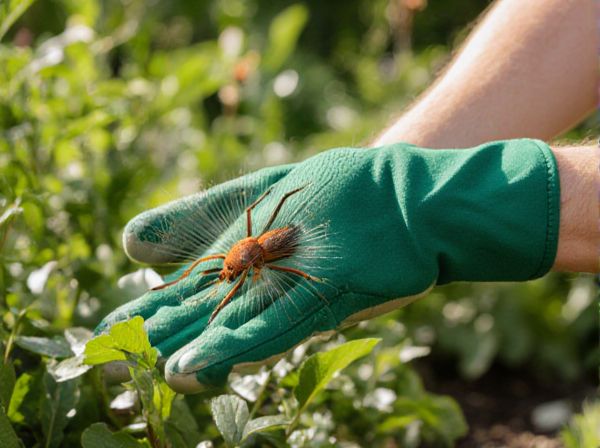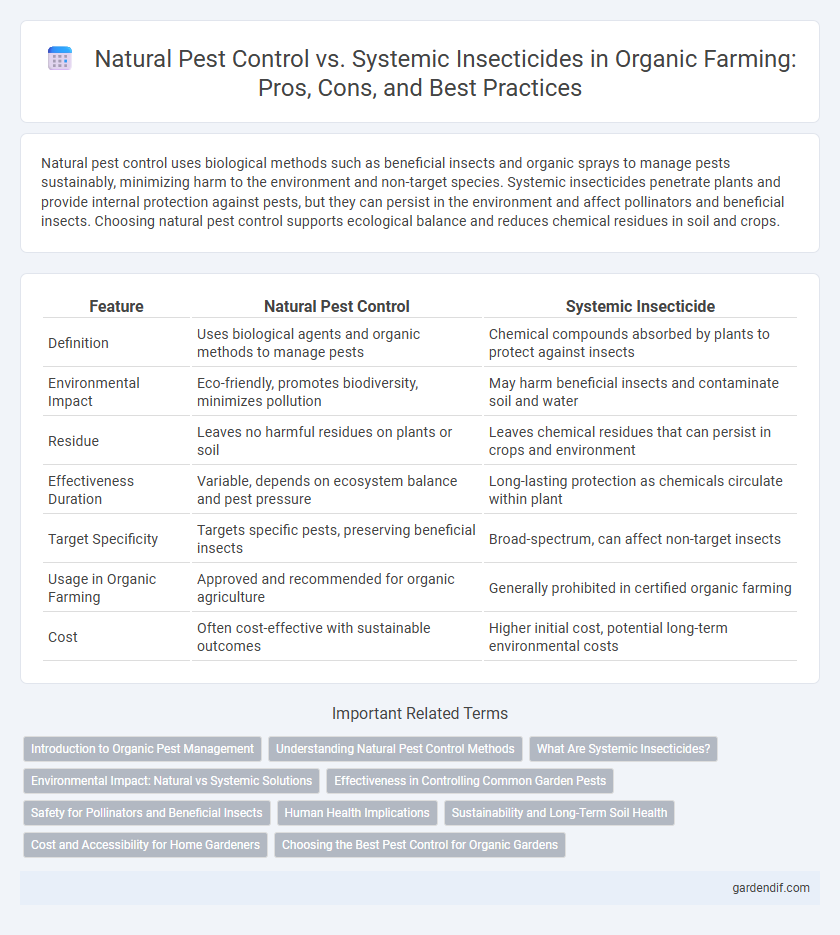
Natural pest control vs Systemic insecticide Illustration
Natural pest control uses biological methods such as beneficial insects and organic sprays to manage pests sustainably, minimizing harm to the environment and non-target species. Systemic insecticides penetrate plants and provide internal protection against pests, but they can persist in the environment and affect pollinators and beneficial insects. Choosing natural pest control supports ecological balance and reduces chemical residues in soil and crops.
Table of Comparison
| Feature | Natural Pest Control | Systemic Insecticide |
|---|---|---|
| Definition | Uses biological agents and organic methods to manage pests | Chemical compounds absorbed by plants to protect against insects |
| Environmental Impact | Eco-friendly, promotes biodiversity, minimizes pollution | May harm beneficial insects and contaminate soil and water |
| Residue | Leaves no harmful residues on plants or soil | Leaves chemical residues that can persist in crops and environment |
| Effectiveness Duration | Variable, depends on ecosystem balance and pest pressure | Long-lasting protection as chemicals circulate within plant |
| Target Specificity | Targets specific pests, preserving beneficial insects | Broad-spectrum, can affect non-target insects |
| Usage in Organic Farming | Approved and recommended for organic agriculture | Generally prohibited in certified organic farming |
| Cost | Often cost-effective with sustainable outcomes | Higher initial cost, potential long-term environmental costs |
Introduction to Organic Pest Management
Natural pest control relies on biological predators, botanical insecticides, and cultural practices to manage pest populations without harmful chemicals. Systemic insecticides, absorbed by plants and distributed internally, provide protection but may negatively impact beneficial insects and soil health. Organic pest management emphasizes ecological balance, promoting long-term sustainability by minimizing synthetic inputs and enhancing natural resistance mechanisms.
Understanding Natural Pest Control Methods
Natural pest control methods utilize biological agents such as beneficial insects, plants, and microbial organisms to manage pest populations effectively without harmful chemicals. These techniques enhance ecosystem balance, reduce environmental impact, and promote sustainable agriculture by targeting pests specifically while preserving beneficial species. Understanding the mechanisms of predation, parasitism, and natural repellents is essential to optimize these methods and achieve long-term pest management success.
What Are Systemic Insecticides?
Systemic insecticides are chemical substances absorbed by plants, spreading throughout their tissues to provide internal protection against pests. Unlike natural pest control methods, which rely on biological agents or organic repellents, systemic insecticides deliver targeted pest management by interfering with insect nervous systems when they feed on treated plants. These chemicals often persist within the plant for extended periods, offering prolonged defense but raising concerns about environmental impact and non-target species safety.
Environmental Impact: Natural vs Systemic Solutions
Natural pest control methods minimize environmental impact by promoting biodiversity and reducing chemical residues in soil and water, supporting sustainable ecosystems. Systemic insecticides, while effective in controlling pests internally within plants, pose risks of contaminating groundwater and harming non-target organisms such as pollinators and beneficial insects. Choosing natural solutions enhances ecological balance and decreases long-term environmental degradation caused by synthetic chemical accumulation.
Effectiveness in Controlling Common Garden Pests
Natural pest control methods leverage beneficial insects, companion planting, and biological agents to effectively reduce common garden pests like aphids, caterpillars, and mites while maintaining ecological balance. Systemic insecticides, absorbed by plants and distributed throughout tissues, deliver targeted pest control but may pose risks to pollinators and beneficial organisms. Studies show natural pest control methods support long-term garden health by preventing pest resistance and preserving soil biodiversity without the chemical residues associated with systemic insecticides.
Safety for Pollinators and Beneficial Insects
Natural pest control methods prioritize the safety of pollinators and beneficial insects by using organic substances and techniques that target pests without harming non-target species. Systemic insecticides, absorbed by plants and distributed through their tissues, pose significant risks to pollinators like bees due to their presence in pollen and nectar. Protecting ecosystems involves choosing pest management strategies that preserve insect biodiversity and maintain pollination services essential for crop production.
Human Health Implications
Natural pest control methods reduce exposure to harmful chemicals, minimizing risks of respiratory issues, skin irritation, and long-term chronic diseases in humans. Systemic insecticides, absorbed by plants, can persist in produce and soil, potentially leading to neurotoxicity, hormonal disruption, and increased cancer risk through dietary intake. Choosing organic pest management supports safer food consumption and promotes overall human health by limiting toxic chemical residues.
Sustainability and Long-Term Soil Health
Natural pest control enhances sustainability by promoting biodiversity and maintaining ecological balance, which supports long-term soil health through improved microbial activity and nutrient cycling. Systemic insecticides, while effective in the short term, often disrupt soil ecosystems and reduce beneficial insect populations, undermining soil fertility over time. Prioritizing natural methods fosters resilient agroecosystems that sustain productivity without chemical dependency.
Cost and Accessibility for Home Gardeners
Natural pest control methods often prove more cost-effective for home gardeners, utilizing readily available materials like neem oil, insecticidal soaps, or beneficial insects that require minimal upfront investment. Systemic insecticides, while sometimes offering longer-lasting protection, tend to be more expensive and may require specialized equipment or knowledge for proper application. Accessibility favors natural options, as they are widely available at garden centers and are safer for non-professional users concerned about chemical exposure.
Choosing the Best Pest Control for Organic Gardens
Natural pest control methods prioritize biodiversity and use beneficial insects like ladybugs and predatory mites to reduce pest populations without harming the environment. Systemic insecticides, though effective, penetrate the plant tissues and may leave residues, potentially threatening pollinators and soil health in organic gardens. Choosing the best pest control involves balancing effectiveness with ecological safety, favoring solutions that support organic certification standards and enhance garden resilience.
Natural pest control vs Systemic insecticide Infographic

 gardendif.com
gardendif.com